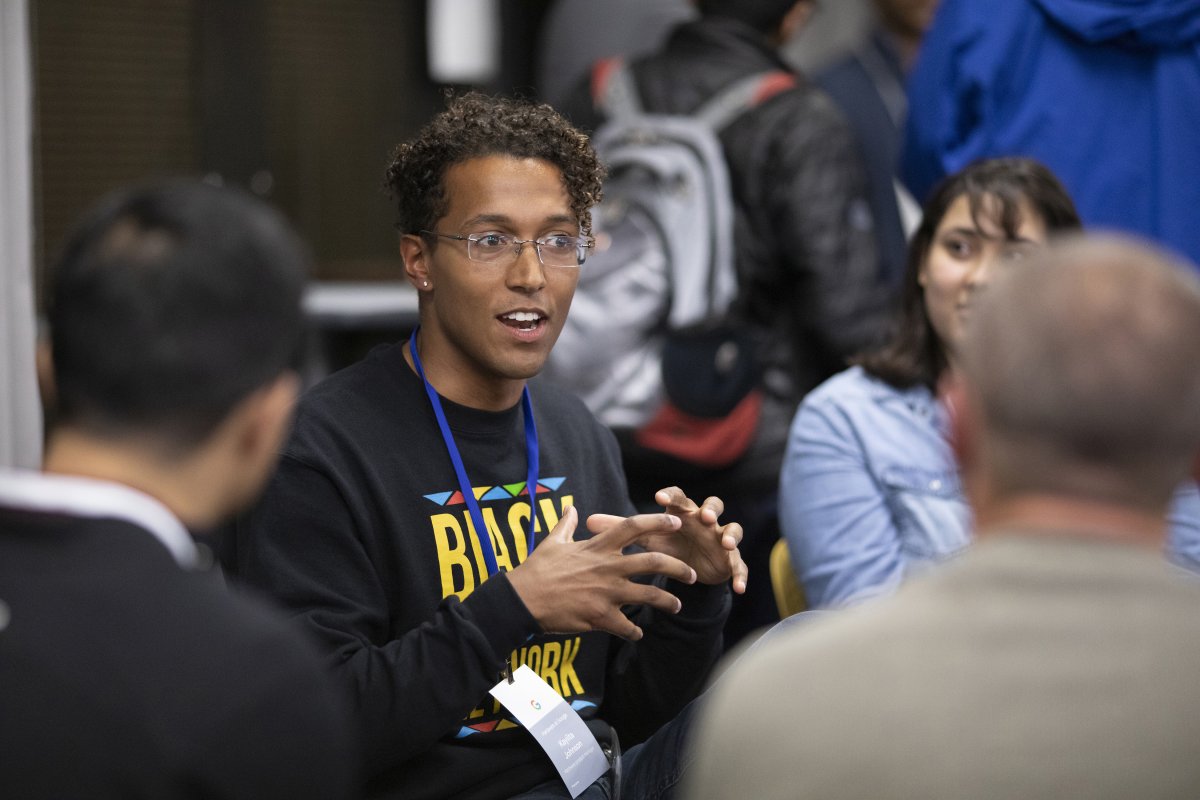Build up Black product managers

Above: Johnson participating in the Made by Google 2019, his employer's annual hardware event.
Photos courtesy of Kayiita Johnson.
Alumnus offers career advice to younger people of color
December 21, 2020
In May of this year, Kayiita Johnson (Electrical Engineering ’13) launched PM While Black, a website devoted to increasing the number of Black product managers in the tech field. It went live just as the news of George Floyd’s death at the hands of a white Minneapolis police officer hit the country.
“It was crazy,” said Johnson, who works as a product manager (PM) at Google in San Jose, Calif. He started getting emails and phone calls from friends, acquaintances, and people he didn’t even know offering to promote his effort.
“People in my bubble were waking up to racism in all its multiple forms. They wanted to do the right thing. People were asking, ‘Should I go protest on the street?’ ‘Hey, should I donate money?’ They were asking ‘What can I do to fix this?’”
PM While Black explains what a product manager does and dishes out advice on how to become one. As Johnson is fond of saying, “Product management is like SoHo House—even if you know about it, good luck getting in.”
The effort grew out of Johnson’s experience of often being the only Black man in the room and devoting “several hours a week” offering career advice and encouragement to younger people of color.
“I’ve really been supported by so many people and I always try to give back,” he said. “I want to make sure I pay it forward.”
Johnson chalks up his success to the support he’s received from family and programs that help underrepresented groups. His mother is a nurse who came to the United States from Uganda at age 18. His father is a physics professor with Swedish and Finnish ancestry. They both emphasized the importance of education and exposed him to STEM.
“My dad would take me to quantum mechanics lectures when I was like eight,” he said. “I was programming video games and learning how to hack in high school.”
Before his freshman year in CSE, Johnson participated in Summer Bridge, a STEM diversity initiative that introduced him to faculty and other students. He also participated in the North Star STEM Alliance and an Engineering Co-op Program with Cooper Power Systems, now Eaton Cooper Power, where he worked on smart thermostat technology.
“From those internships, I knew I wanted to do something that combined tech skills with interpersonal, persuasion, and leadership skills,” he said.
After graduating with a degree in electrical engineering and a minor in Chinese, Johnson, who received CSE’s Frederick McKinley Jones Scholarship, was hired by Texas Instruments and ended up selling semiconductors to startup companies in New York City.
The environment was intoxicating—full of steep challenges and exposure to the world of entrepreneurism and venture capital. But he realized he wanted to nurture a single project from concept to launch. Friends said they knew exactly what he should do—form a company.
“I said, ‘OK that makes sense, but what’s a lower-risk version of that?’ And that’s how I learned about product management,” he said.
After earning his MBA at Stanford, Johnson landed a job at Google. He started in August 2018 on the same day the company announced the brand merger of Google and Nest, the maker of smart thermostats and smoke detectors.
He’s working on the next generation of Google’s Nest Hub, the touchscreen display that functions as a voice-controlled smart speaker. He can’t say much about his work, only that he also works on projects like ensuring the voice commands “Hey Google’ or “Okay Google” respond to us and not a random commercial.
In the end, being a product manager is about anticipating what customers will want and then building the team of researchers, engineers, user experience designers, and other specialists to get it made. Johnson thinks it requires a skillset that many African American have honed simply through being part of a marginalized group.
“There are so many Black people I know who would be excellent product managers,” he said.
“I feel like Black people can be really good product managers because a lot of times, things aren’t really designed for them. They have this personal experience with that gap in the user experience. So, as a profession, I think we’re really underutilizing people who could help make products better for everyone.”
Read more stories from our Winter 2021 college magazine.
By Maja Beckstrom
